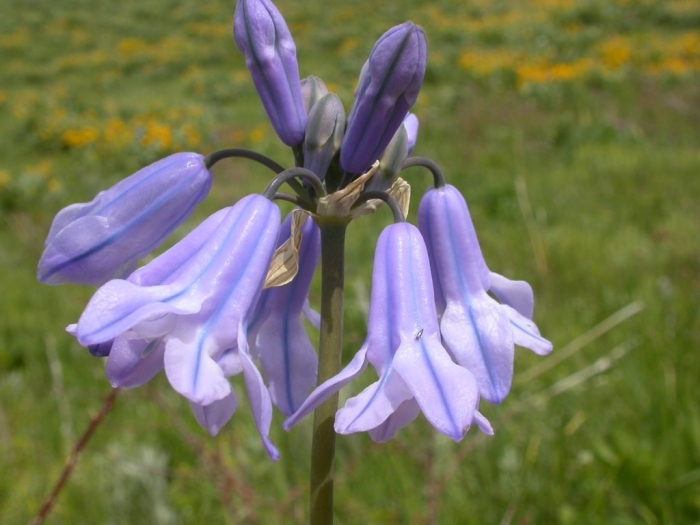Largeflower Triteleia
(Triteleia grandiflora)
Largeflower Triteleia (Triteleia grandiflora)
/
/

Matt Lavin
CC BY 4.0
Image By:
Matt Lavin
Recorded By:
Copyright:
CC BY 4.0
Copyright Notice:
Photo by: Matt Lavin | License Type: CC BY 4.0 | License URL: http://creativecommons.org/licenses/by/4.0/ | Rights Holder: Matt Lavin | Publisher: iNaturalist | Date Created: 2009-06-14T11:57:36-07:00 |

























Estimated Native Range
Summary
Triteleia grandiflora, commonly known as largeflower triteleia, is a perennial herb that emerges from a corm. It is native to the grasslands, open woodlands, and meadows of western North America, specifically from British Columbia to California and eastward to Idaho, Montana, and Utah, with isolated populations in Wyoming and Colorado. This species typically grows two or three basal leaves that can reach up to 28 inches in length and produces a smooth, erect stem that can stand up to 30 inches tall. The plant is known for its attractive umbel-like clusters of flowers, which bloom from late spring to early summer and range in color from deep blue to white, each with a funnel-shaped corolla up to 1 inch long. The flowers are particularly showy and can add a splash of color to garden settings.
Largeflower triteleia is valued for its ornamental flowers, which can be used in border plantings, rock gardens, and as cut flowers due to their long vase life. It is relatively low-maintenance, requiring well-drained soil and full sun to part shade. While the corm is edible and was historically consumed by Native Americans and settlers, it also provides food for wildlife such as rodents and livestock. The plant is generally resistant to pests and diseases but can be susceptible to rot if overwatered or planted in poorly drained soils. There are no significant problems with aggressive roots or invasiveness.CC BY-SA 4.0
Largeflower triteleia is valued for its ornamental flowers, which can be used in border plantings, rock gardens, and as cut flowers due to their long vase life. It is relatively low-maintenance, requiring well-drained soil and full sun to part shade. While the corm is edible and was historically consumed by Native Americans and settlers, it also provides food for wildlife such as rodents and livestock. The plant is generally resistant to pests and diseases but can be susceptible to rot if overwatered or planted in poorly drained soils. There are no significant problems with aggressive roots or invasiveness.CC BY-SA 4.0
Plant Description
- Plant Type: Herb
- Height: 1.5-2 feet
- Width: 0.5-1 feet
- Growth Rate: Moderate
- Flower Color: Blue, Purple, White
- Flowering Season: Spring, Summer
- Leaf Retention: Deciduous
Growth Requirements
- Sun: Full Sun, Part Shade
- Water: Medium
- Drainage: Medium
Common Uses
Bee Garden, Bird Garden, Border Plant, Butterfly Garden, Hummingbird Garden, Low Maintenance, Rock Garden
Natural Habitat
Native to grasslands, open woodlands, and meadows of western North America
Other Names
Common Names: Largeflower Triteleia, Fool’s Onion, Blue-Lily, Wild Hyacinth, Douglas’ Brodiaea
Scientific Names: , Triteleia grandiflora, Brodiaea bicolor, Brodiaea douglasii, Brodiaea douglasii var. howellii, Brodiaea grandiflora, Brodiaea grandiflora var. major, Brodiaea grandiflora var. major, Brodiaea howelliae, Brodiaea howellii
GBIF Accepted Name: